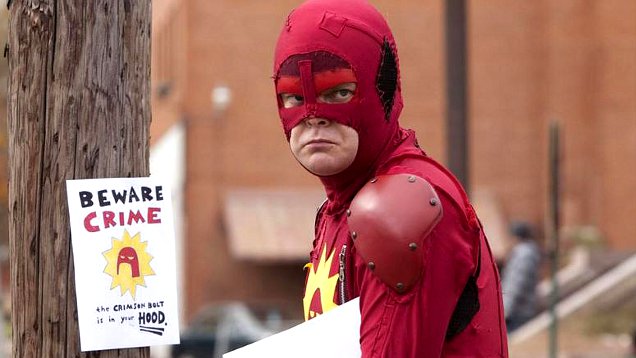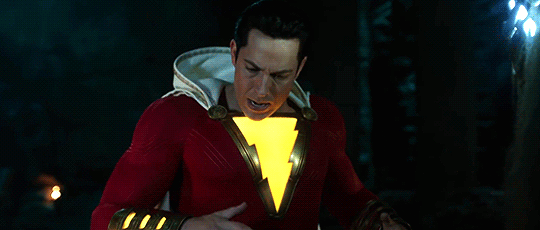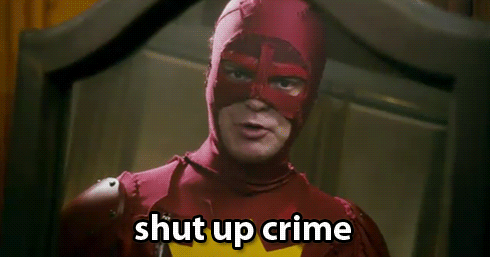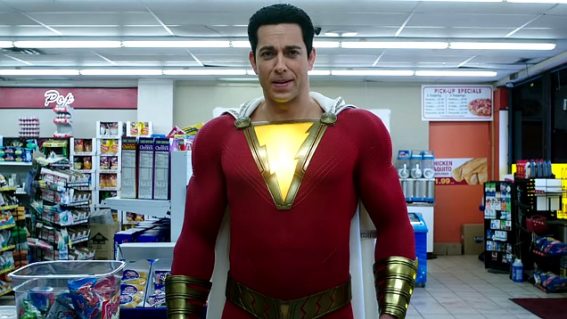Shazam! was OK, but the 2010 film Super is a truly superb superhero comedy

In the wake of the box office success of Shazam!, critic Luke Buckmaster asks: what does a truly excellent superhero comedy look like? It looks, he says, dangerously like James Gunn’s ridiculously good 2010 film Super.
I enjoyed parts of the rambunctious superhero comedy Shazam!, but by God the film is bloated. Director David F. Sandberg would like us to believe that he has a tongue-in-cheek and breezily self-aware attitude towards his own material and understands the film’s place in the scheme of things: as one more round of the featherheaded mumbo-jumbo we have come to expect from tales of undies on the outside do-gooders.
But Shazam!‘s 132 minute running time – obscene for a production that amounts to little more, conceptually speaking, than a one trick pony – makes it clear that Sandberg does indeed take the material pretty seriously. Why else would he spend so much time building up to so little? With undue emphasis on the backstory of the villain (played by Mark Strong) and a boring chunk involving a wizard played by Djimon Hounsou, the film is a lithe and punchy 90 minute lark trapped inside an obese and unwieldy frame.
Once transported into the hot beefed-up bod of Zachary Levi, 15-year-old protagonist Billy (Asher Angel) gains powers and expands in size and stature. The film itself on the other hand loses some of its charm through its ballooning waistline. Many reviews have praised Shazam! for not taking itself too seriously, which says more about the oversupply of heavy-handed superhero movies than anything in this one truly worthy of applause.

So what, you might ask, does an inventive, edgy and dangerously good superhero comedy look like? Well, it looks a lot like writer/director James Gunn’s outrageous 2010 film Super: a superhero flick as black as they come, constructed with flair and wit and cooked up with a devil’s grin.
The comedy is so black it completely warps the film’s sense of morality, freeing it from even the most basic moral expectations. Anybody might die at any time, even the heroes, for the simple reason that there are no ‘good’ guys in this world, only people doing bad things with varying degrees of wickedness. The story follows the sad and desperate plight of Frank (Rainn Wilson) who creates a monkey wrench-wielding alter ego called The Crimson Bolt, believing that God has summoned him to fight bad guys – who range from violent criminals to people cutting in line at the movies.
Gunn explores a connection rarely made in superhero movies, between vigilantism and mental illness (consult Kick Ass and the ambitious Australian film Griff the Invisible for other examples). We don’t trust the protagonist – certainly not in terms of his sanity, or his ability to meaningfully determine right from wrong. We do however feel sympathy for him as a victim of the creations inside his own head, and as the sad chump he becomes when his wife Sarah (Liv Tyler) leaves him for a sleazy drug dealer (Kevin Bacon).
The film opens with Frank reflecting on the two perfect moments in his life, illustrated in a pared-back colour scheme to evoke the past. One is “when I married Sarah.” In a visualisation of the other, we see him standing outside a shop when a criminal rushes past with a police officer close behind. “He went in there officer!” Frank shouts, looking intensely pleased with himself. These are, shall we say, humble origins for a crime-fighting vigilante.
Rainn Wilson’s tremendously entertaining performance was clearly informed by his anti-cool performance as Dwight in The Office – a thoroughly memorable character: not a smooth operator, that’s for sure, though not dorky in the expected way either. In Super, Ellen Page is intentionally over the top as his starstruck sidekick Boltie. Her character is a clerk at a comic book shop who is thrilled by the prospect of comic mythology entering real-life.

Super is sprinkled with visual inventions and the enveloping mood is brutally playful. When a detective knocks on Frank’s front door, and a nervous Frank goes to answer it, we see an image appear inside his head (literally) illustrating his thoughts about the future. In this paranoid window into his mind, we see Frank laughed at in the police station, sentenced by a judge, then raped in prison. All of this transpires in a handful of seconds. The narrative efficiency of this film is thrilling. It’s playful, dense, restless. Sarah has left Frank well before the 10 minute mark; this is ordinarily the sort of thing you would expect to see fleshed out over an entire first act.
The film is also very funny. In one laugh-out-loud moment we watch a montage of The Crimson Bolt’s various acts of “heroism,” i.e. Frank assaulting people with a monkey wrench then uttering his catch phrase “shut up, crime!” The “no butting in line!” scene is a hard-hitting (in more than a single sense) classic. Clearly these are the antics of a madman. Frank’s burger-flipping colleague’s description of The Crimson Bolt is on the money: “This crazy motherfucker dressed like Superman is whacking people with a pipe wrench all over the city.”
Most superhero movies reiterate the fantasy that the world is a sweet place where good ultimately triumphs over evil. Super on the other hand delights in offering no assurances of any kind – even that good and evil exist in the first place. Its world, like ours, is populated by thieves and lunatics. To say the film’s outlook – not to mention its sense of style – is refreshing is something of an understatement.
















